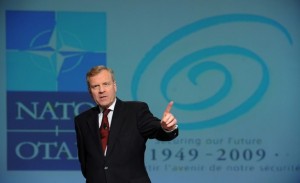Scrap NATO?
 As the NATO heads of government prepare to converge on Kehl and Strasbourgh for the Alliance’s 60th anniversary Summit, they’re facing extreme skepticism from some heavy hitters in the security policy community. Ted Galen Carpenter terms it a “Hollow Alliance.” Andrew Bacevich wants the USA to quit in order to save it. Mark Medish wants to rename it POTATO.
As the NATO heads of government prepare to converge on Kehl and Strasbourgh for the Alliance’s 60th anniversary Summit, they’re facing extreme skepticism from some heavy hitters in the security policy community. Ted Galen Carpenter terms it a “Hollow Alliance.” Andrew Bacevich wants the USA to quit in order to save it. Mark Medish wants to rename it POTATO.
In my New Atlanticist rejoinder, “The Case For NATO,” I acknowledge that their criticisms have merit but that they’re missing the big picture.
In the over ten years that I participated in NATO defense programs, oddly enough representing a Dutch company, the most disheartening message that I received over and over again was: "Let the Americans pay for it!" There was, and probably still is, a concerted effort to delay and harrangue simply to frustrate the US contingent into recommending that we go ahead and pay for the program, whatever it was, simply to get on with it. This was extremely frustrating for those of us that wanted NATO to stay first-class all the way, especially when we saw that the other members were programming perhaps as much as 3% of their budgets for defense, while we were racking up 10-12% yearly.
But, the major blow was the rather sudden diminishment of the Russian threat, which left NATO without a clear and present danger to meet in the near future. Many advanced technical programs were canceled or stretched out as a result, covering new command and control systems, a new intel system, an upgrade to the air defenses of Europe, and new communications upgrades, each of which were major efforts demanding significant funding lines. I do not know where these stand today, but I seriously doubt they have had reasonable progress since 1992.
Individual nations have had their own weapons development programs, and they have had some successes in doing so. But, the actual fielding of modernized forces that incorporate these new weapons capabilities lags significantly, and the number of combat ready troops has not been maintained at a reasonable level for the defense of Europe, in my opinion.
Without a clear and present danger to spark the individual nations to rearm and upgrade their forces, and without a mission statement that NATO can hang its hat on comfortably, the stage is set for yet another rape of the US Treasury for seed money and more from the members.
Taking these factors into account, I believe that the European nations should be reorganized to assume the lead in NATO, and the US should reduce its participation substantially, including withdrawal of all but a token "tripwire" force of perhaps a few brigades, and a reduction in payments for NATO operations to a managable level, over a withdrawal period long-enough for the Europeans to assume their new role properly.
In my opinion, we have subsidized the European's defense for too long, which has had the result that they are too weak to defend themselves, and will "Let the Americans do it" even more.
This new Comment limitation is rather annoying, especially when the argument to be posted demands a reasonable development. How about increasing the allowed word count by a factor of 3?
Interesting now that Comrade Obama is running things, the Europeans are a little more careful about their self-defense. Should Sarkozy fully rejoin the military arm of NATO, this would indicate that just maybe Western Europe understands the nature of the threats it faces. Russia, extreme Islam among others, just might throw a missile their way. Without a way to shoot it down, it will be a European city that takes the hit.
They know Obama's naive world view doesn't hold this as a possibility. Are the Europeans ready to take that chance? If not, they need to step forward and train troops that can and are willing to fight (not like overweight Germans in Afghanistan).. They also have to cover some of the costs.
The silver lining to the Obama cloud is that He makes real the possibility that the US won't be there to protect or to pay for European defense.
One thing to keep in mind is that there is a whole range of options between full NATO participation and the US-out-of-Europe. We could, for example, pull all our commitments to NATO off the chart, but then maintain nuclear protection (i.e., say that we’ll nuke the crap out of anyone who fundamentally threatens the survival and integrity of Europe, or such). Or keep air bases in the UK under lease (or by agreement).
If anything, forcing Europe to deal with its own security could be a good thing, for it offers the possibility of deeper European integration (meaning less of a chance of a European continental war). Common defense, after all, is one of the key aspects of a state, and that seems to be where Europe is ultimately heading.
You know, I see this
quite a bit. But I don’t think I’ve never seen any cites to proof or demonstration, just the bare assertion. Would you be so kind as to provide me–us–with cites that substantiate the claim? Thanks.
The bare assertion works for me, in this case!
Naive is as naive does.
How about spending 13 trillion dollars that we don’t have? My great grandchildren will be paying for this.
How about grabbing control of GM? Pure evil.
How about his entire agenda? Anyone that moves us towards socialism is by definition naive, since it has been shown over and over that Utopian government cannot and does not work.